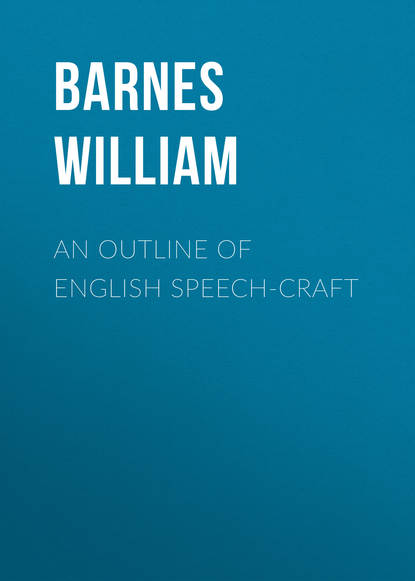По всем вопросам обращайтесь на: info@litportal.ru
(©) 2003-2024.
✖
An Outline of English Speech-craft
Настройки чтения
Размер шрифта
Высота строк
Поля
Or as bidden to be taken, as ‘Go thy way.’
Stead-marks and Way-marks of Time-takings.
Case.
Things named in speech, so as to mark the stead of the beginning or end, or of the way of the time-taking at any point of its length or outreach in time or room, are Case-things.
There are, however, two cases which are speech-cases and not stead-marks or way-marks: —
(1) That of the of-spoken thing (nominative), the thing of which the speech speaks, as ‘The bird flies’; and
(2) The to-spoken thing (vocative), as ‘O sing, sweet bird.’
Cases are marked by shapes of thing-names or by case-words, or by the setting of the case-word either after or before the time-word, as ‘The dog drove out the cat,’ where the dog is the beginning of the time-taking; or ‘The cat drove out the dog,’ where the dog is the end of it, and is shown to be so by the setting of its name after the time-word.
Source.
‘The bird flew from, or off, or out of the tree.’
‘He died of or from intemperance.’
The tree and intemperance are source-marks of flew and died.
End or Aim.
‘John loved George.’
‘He went to or towards London.’
‘Edwin worked for wages, or strolled along by the stream.’
The Stead Case.
‘John was in the field or at the church.’
The Tool.
‘Alfred wrote with a pen.’
‘The bird flew before, behind, over, under, above, below, by, around, or through the gate-turret,’ which is the way-mark of flew.
There is a Source-mark which is a source of the time-taking, not as being only that thing, but as being a thing then in some shape or kind of time-taking.
‘(a) The wind being against us, (b) we made but little way.’ a is the source of b, ‘we made but little way,’ not from the wind simply as wind, but as also being against us.
‘You being my leader, I shall overcome.’
This is commonly called the absolute case (allfree case); though the wind is not free of a time-taking (being against us). It may be called the ‘thing-so-being’ case.
Some tongues mark many of the cases by sundry endings of the thing-name, but we have in common names only one ending for case, the possessive, as ‘the horse’s mane,’ ‘John’s house.’
In name-tokens we have three case-forms, as thou, thy, thee—thy for the possessive, and thee for all the other cases.
‘The bird flew from the apple-tree in the corner of the garden, through the archway, and under the elm by the barn, round the hayrick, and on over the stream just below the willow, and above the bridge, and then to the stall, and on towards the wood, and into an ivy-bush.’
Here the sundry named things are way-marks which mark the place of the flying in its beginning and end, and at sundry points of its length.
Such stead-marks or way-marks may be taken as in either of one or two or three cases, as they may be either stead-marks or way-marks, and as their beholdingness to the time-taking may be reckoned to it or from it to themselves.
‘The bird flew over or under or by the tree.’ The flying at first reached on nearer towards the tree, and then reached off again farther from it, so that the tree was at first in the case of a toness, and then in the case of a fromness, with the flying.
But under the wording ‘the roof is over the floor,’ or ‘the floor is under the roof,’ the time-taking is is a staid and not an ongoing one, and either the roof or the floor may be in the fromness or toness case, as the height may be reckoned from it to the other, or to it from the other.
A housemother may say ‘We live near (to) Fairton’ (toness case); yet an hour afterwards she may say ‘We live too far from Fairton (fromness case) to step in readily for errands.’
Her abode may be four miles from Fairton, so that the time-taking live is as far from Fairton in one case as the other; and yet it puts it in two sundry cases.
‘If Alfred gave to Edred a field,’ the time-taking gave ended in the mid-thing, the field (the endingness case), but it put the field to Edred, as his, in the toness case.
The place of a time-taking may be shown by one place-mark, or by two or three, of which a latter may mark the place of a former, as ‘The rooks build in the elms, above the house,’ where the elms mark the place of the building, and the house marks that of the place-mark (the elms).
But some case-words are made up of a smaller case-word and a thing-name, as ‘Alfred sat beside the wall.’ Beside being ‘by the side,’ and the side of the wall (whereof case).
The figure for case-shifting, or the changing of the case-tokens, is called in Gr. enallage as
‘I have ten sovereigns in my purse’; ‘My purse contains ten sovereigns.’
‘The pump has a new handle’; ‘There is a new handle to the pump.’
‘The carpet in the hall’; ‘The carpet of the hall.’
‘The brother of or to that lady.’
‘John likes cricket or is fond of cricket.’
‘Greedy of gain or for gain.’
‘Think of me or on me.’
‘He was killed by a blow of a club or with a club.’
‘He spoke in the balcony or from the balcony.’
THOUGHT-WORDING, SPEECH-WORDING,
is the setting of words or a bewording of thought or speech (syntax).
A thought-wording (proposition) is a bewording of the case of a thing with its time-taking. ‘The boy is good’ or ‘the boy plays.’





